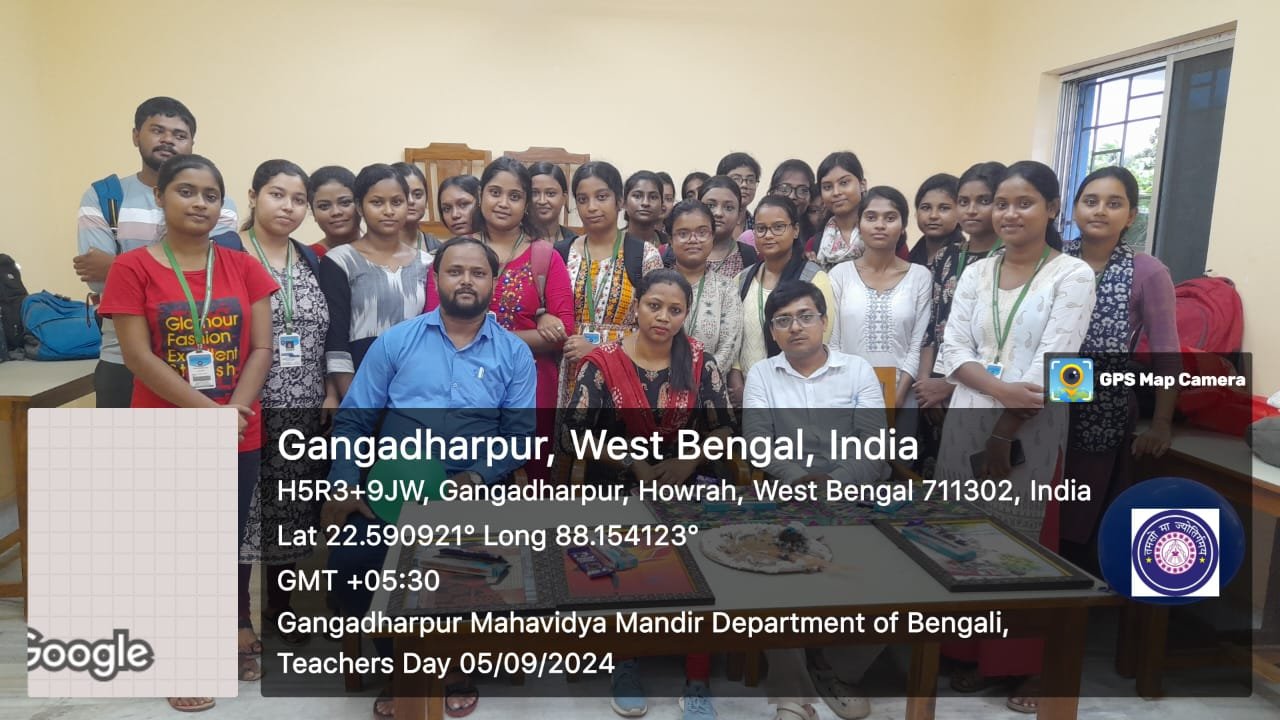
Bengali বাংলা
- About
- Faculty Profile
- Notice
- Program Offered
- Syllabus
- Program Outcome
- Course Outcome
- Routine
- Academic Calendar
- Pass Out Students
- Running Students
- Student Progression
- Student Achievement
- Academic Resource
- Activities
- Result Analysis
- Gallery
- Answer Script Submission
বাংলা ভাষায় রচিত সাহিত্যকর্ম বাংলা সাহিত্য নামে পরিচিত। আনুমানিক খ্রিষ্টীয় সপ্তম শতাব্দীর মাঝামাঝি বাংলা ভাষায় সাহিত্য রচনার সূত্রপাত হয়। খ্রিষ্টীয় দশম থেকে দ্বাদশ শতাব্দীর মধ্যবর্তী সময়ে রচিত বৌদ্ধ দোহা-সংকলন চর্যাপদ বাংলা সাহিত্যের প্রাচীনতম নিদর্শন। আবিষ্কারক হরপ্রসাদ শাস্ত্রী আরও তিনটি গ্রন্থের সঙ্গে চর্যাগানগুলি নিয়ে সম্পাদিত গ্রন্থের নাম দেন ” হাজার বছরের পুরাণ বাঙ্গালা ভাষায় রচিত বৌদ্ধ গান ও দোহা “। মধ্যযুগীয় বাংলা সাহিত্য ছিল কাব্যপ্রধান। হিন্দুধর্ম, ইসলাম ও বাংলার লৌকিক ধর্মবিশ্বাসগুলিকে কেন্দ্র করে গড়ে উঠেছিল এই সময়কার বাংলা সাহিত্য। মঙ্গলকাব্য, বৈষ্ণব পদাবলি, শাক্তপদাবলি, বৈষ্ণব সন্তজীবনী, রামায়ণ, মহাভারত ও ভাগবতের বঙ্গানুবাদ, পীরসাহিত্য, নাথসাহিত্য, বাউল পদাবলিএবং ইসলামি ধর্মসাহিত্য ছিল এই সাহিত্যের মূল বিষয়। বাংলা সাহিত্যে আধুনিকতার সূত্রপাত হয় খ্রিষ্টীয় অষ্টাদশ শতাব্দীতে। ঊনবিংশ শতাব্দীতে বাংলার নবজাগরণের যুগে কলকাতা শহরকে কেন্দ্র করে বাংলা সাহিত্যে এক নতুন যুগের সূচনা হয়। এই সময় থেকে ধর্মীয় বিষয়বস্তুর বদলে মানুষ, মানবতাবাদ ও মানব-মনস্তত্ত্ব বাংলা সাহিত্যের প্রধান আলোচ্য বিষয় হয়ে ওঠে। ১৯৪৭ সালে ভারত বিভাগের পর বাংলা সাহিত্যও দুটি ধারায় বিভক্ত হয়: কলকাতা-কেন্দ্রিক পশ্চিমবঙ্গের সাহিত্য ও ঢাকা-কেন্দ্রিক বাংলাদেশের সাহিত্য। বর্তমানে বাংলা সাহিত্য বিশ্বের একটি অন্যতম, সমৃদ্ধ সাহিত্যধারা হিসেবে পরিগণিত হয়ে থাকে।

Debottam Sarkar
SACT
View Profile
Abhijit Das
SACT
View Profile
Ishita Mukherjee
SACT
View Profile
Nasrin Mridha
SACT
View Profile
Dulali Saren
Assistant Professor
View Profile
Dr Surojit Bag
Assistant Professor
View Profile
Bengali honours undergraduate
UG Programme Outcome
PO1. Critical Thinking: Take informed actions after identifying the assumptions that frame thinking and action, checking out the degree to which these assumptions are accurate and valid, and looking at our ideas and decisions (Intellectual, Organization and personal) from different perspectives.
PO2. Effective Communication: Speak, Read, Write and Listen clearly in person or through electronic Media in English and in one Indian language, and make meaning of the world by connecting people, ideas, books, media and technology.
PO3. Social Interaction: Elicit views of others, mediate disagreement and help reach conclusions in group settings.
PO4. Effective Citizenship: Demonstrate empathic social concern and equity centred national development, and the ability to act with an informed awareness of issues and participate in civic life through volunteering.
PO5. Ethics: Recognize different value systems including your own, understand the moral dimensions of your decisions and accept responsibility for them.
PO6. Environmental and Sustainability: Understand the issues of Environmental contexts and sustainable development.
PO7. Self-Directed and life-lo0ng learning: Acquire the ability to engage in independent and life-long learning in the broadest contexts socio-technological changes.
UG Programme specific outcome
Structuring a meaningful arguments and liberal mindset.
After completing the education, our curriculum will help the student to become self-reliant in their future life, now they will become useful in fulfilling their social responsibilities by researching various subject.
Realizing the basics of literature and properly criticize it by methods and theories
Philosophically viewing knowledge with pace of thought process.
Giving an idea of Cultural Revolution, language, literature, heritage, history and eco-politics.
After studying the entire syllabus, student will get a complete understanding of Bengali language, literature and contemporary socio-economic, cultural life.
Constructing the ideas of social development and changes.
Involving in literary progress, reasoning with deep understanding.
By teaching different varieties of Bengali literature, the students will acquire proper knowledge about the contemporary Indian and Western society, history, culture, civilization etc. and the course will play a helpful role as the basis of what will be their proper role in the development of social life.
UG Programme Course Outcome
Paper Name
CO-1-1:
History of Bengali Literature(up to 1800 A.D.)
*An idea of social characteristics of mediaeval age.
* Consciousness on and about ancient Bengali literature.
CO-1-2:
Linguistics
*Primary idea on linguistics.
*An elaborate idea on Bengali language and linguistics.
CO-2-3:
History of Bengali
Literature (19th Century)
*A Conception about modern poet and poetics and developments of Bengali drama.
*Prose-works and its history
CC-2-4:
Bengali Literature
(Primary Concept)
*A Conception about ancient poetry as well as modern one.
*Develop their creative writing.
CC-3-5:
History of Bengali
Literature (20th Century)
*An idea on mapping of literature with new eras.
*Differentiate History and Literature.
CC-3-6:
Historical Philology
*Idea about the inner-science of Language.
*Different age of Philology.
CC-3-7:
Novels & Short Stories
*Enjoy the narratives.
*Concept about Society as well as country.
CC-4-8:
Pre modern literature
*Development of aesthetic sense.
*Sense about a Certain era.
CO-4-9:
Rhetoric, Prosody & Poetics
*Idea about Bengali language.
*Poetics Rhetoric with poetical methods.
CC-4-10:
Essay & Comprehension
*Notion about framing the prose.
*Express an idea through their articulacy.
CC-5-11:
Structure of Literature
*Different stylistics of literature.
*Develop the sense of literary-essence.
CC-5-12:
Drama & Stage
*Enjoy the text of drama.
*Perception of stage and play.
CO-6-13:
Modern Poetry
*Awareness of different style of talented poets.
*Love to read & write
CO-6-14:
History of Sanskrit ,English & Hindi
*Compare the different literary essence.
*Senses about the brilliance of different literature.
| Sl.No | Day | No. of Holidays | ||
|---|---|---|---|---|
| 1 | English New Year’s Day | 01/01/2024 | Monday | 01 |
| 2 | Birthday of Swami Vivekananda | 12/01/2024 | Friday | 01 |
| 3 | Makar Sankranti | 15/01/2024 | Monday | 01 |
| 4 | Birthday of Netaji | 23/01/2024 | Tuesday | 01 |
| 5 | University Foundation Day | 24/01/2024 | Wednesday | 01 |
| 6 | Republic day | 26/01/2023 | Friday | 01 |
| 7 | Day before Saraswati Puja | 13/02/2024 | Tuesday | 01 |
| 8 | Birthday of Thakur Panchanan Barma and Saraswati Puja | 14/02/2024 | Wednesday | 01 |
| 9 | Shab-e-Barat | 26/02/2024 | Monday | 01 |
| 10 | Shivratri | 08/03/2024 | Friday | 01 |
| 11 | Doljatra | 25/03/2024 | Monday | 01 |
| 12 | Holi | 26/03/2024 | Tuesday | 01 |
| 13 | Good Friday | 29/03/2024 | Friday | 01 |
| 14 | Easter Saturday | 30/03/2024 | Saturday | 01 |
| 15 | Day before Id-Ul-Fitar | 10/04/2024 | Wednesday | 01 |
| 15 | Id-Ul-Fitar | 11/04/2024 | Thursday | 01 |
| 17 | Birthday of Dr. B.R. Ambedkar | 14/04/2024 | Sunday | 00 |
| 18 | Bengali New Year’s Day (Nababarsha) | 15/04/2024 | Monday | 01 |
| 19 | Mahavir Jayanti | 21/04/2024 | Sunday | 00 |
| 20 | May Day | 01/05/2024 | Wednesday | 01 |
| 21 | Birthday of Rabindra Nath Tagore | 08/05/2024 | Wednesday | 01 |
| 22 | Buddha Purnima | 23/05/2024 | Thursday | 01 |
| 23 | Id-Ul-Zoha(Bakrid) | 17/06/2024 | Monday | 01 |
| 24 | Rathayatra | 07/07/2024 | Sunday | 00 |
| 25 | College Foundation Day | 11/07/2024 | Thursday | 01 |
| 26 | Muhharam | 17/07/2024 | Wednesday | 01 |
| 27 | Independence Day | 15/08/2024 | Thursday | 01 |
| 28 | Rakhi Purnima | 19/08/2024 | Monday | 01 |
| 29 | Janmastami | 26/08/2024 | Monday | 01 |
| 30 | Fatehe-Dwaz-Daham | 16/09/2024 | Monday | 01 |
| 31 | Viswakarma Puja | 17/09/2024 | Tuesday | 01 |
| 32 | Gandhi Jayanti & Mahalaya | 02/10/2024 | Wednesday | 01 |
| 33 | Puja Vacation | 07/10/2024 to 04/11/2024 | Monday to Monday | 29 |
| 34 | Chhat Puja | 07/11/2024 | Thursday | 01 |
| 35 | Additional Day After Chhat Puja | 08/11/2024 | Friday | 01 |
| 36 | Jagaddhatri Puja | 10/11/2024 | Sunday | 00 |
| 37 | Birthday of Birsa Munda & Birthday of Guru Nanak | 15/11/2024 | Friday | 01 |
| 38 | Christmas Holidays | 25/12/2024 to 31/12/2024 | Wednesday to Tuesday | 07 |
Subject: Bengali honours undergraduate
UG Programme Course Outcome
| Paper Name | Course Outcomes |
| CO-1-1:
History of Bengali Literature (up to 1800 A.D.) |
*An idea of social characteristics of mediaeval age.
* Consciousness on and about ancient Bengali literature. |
| CO-1-2:
Linguistics |
*Primary idea on linguistics.
*An elaborate idea on Bengali language and linguistics. |
| CO-2-3:
History of Bengali Literature (19th Century) |
*A Conception about modern poet and poetics and developments of Bengali drama.
*Prose-works and its history |
| CC-2-4:
Bengali Literature (Primary Concept) |
*A Conception about ancient poetry as well as modern one.
*Develop their creative writing. |
| CC-3-5:
History of Bengali Literature (20th Century) |
*An idea on mapping of literature with new eras.
*Differentiate History and Literature. |
| CC-3-6:
Historical Philology |
*Idea about the inner-science of Language.
*Different age of Philology. |
| CC-3-7:
Novels & Short Stories |
*Enjoy the narratives.
*Concept about Society as well as country. |
| CC-4-8:
Pre modern literature |
*Development of aesthetic sense.
*Sense about a Certain era. |
| CO-4-9:
Rhetoric, Prosody & Poetics |
*Idea about Bengali language.
*Poetics Rhetoric with poetical methods. |
| CC-4-10:
Essay & Comprehension |
*Notion about framing the prose.
*Express an idea through their articulacy. |
| CC-5-11:
Structure of Literature |
*Different stylistics of literature.
*Develop the sense of literary-essence. |
| CC-5-12:
Drama & Stage |
*Enjoy the text of drama.
*Perception of stage and play. |
| CO-6-13:
Modern Poetry |
*Awareness of different style of talented poets.
*Love to read &write |
| CO-6-14:
History of Sanskrit ,English & Hindi |
*Compare the different literary essence.
*Senses about the brilliance of different literature. |
Subject: Bengali Generic elective undergraduate
(A-i) Course Outcome: (DCC)
| Paper Name | Course Outcomes |
| CC/GE 1-1:
History of Bengali literature (19th Century) |
*To get elaborate knowledge about history of modern Bengali Literature and its development. |
| CC/GE 2-2:
Historical Philology Rhetoric Prosody. |
*The students will get a details idea on Bengali language and Linguistics and a sound knowledge about Rhetoric & Prosody. |
| CC/GE 3-3:
Bengali Poetry & Drama |
*It helps the students to get a conception about history & its
development of Bengali poetry and drama. |
| CC/GE 4-4:
Novel, Short story & Essay |
*It helps the students to get a conception about history & its
development of Bengali fiction, short story and essay. |
(A-ii) Course Outcome: (LCC)
| Paper Name | Course Outcomes |
| LCC (2) 4-1:
Linguistics, Structure of literature & Poetics |
*To get in depth knowledge in linguistics and in history of Bengali language.
*To get detail definition and characteristics of different forms of Bengali literature. |
| LCC (2) 6-2:
Periodicals, Novels & short story |
*Details understanding of history of Bengali Novels & short stories.
*To develop concept of different periodicals, their back ground and contribution to Bengali literature. |
- Course Outcome: (DSE)
| Paper Name | Course Outcomes |
| DSE-A-5-1:
The Social & Cultural history of Bengal |
*Students can know about the social and cultural history of Bengal.
*Students will be able to connect the literature with society. |
| DSE-A-5-2:
Bengali Detective, Novels & story, science fiction and miracle narratives. |
*It makes the syllabus more interesting for the students and may encourage
student’s consciousness. *It may student’s cognitive knowledge. |
| DSE-B-6-1:
Partition & Bengali Literature. |
*It gives over view about independence of India and the effect of partition on Indian society and literature. |
| DSE-B-6-2:
Folk Culture & Literature. |
*It may create and understanding of rural Bengal and its cultural heritage. |
- Course Outcome: (SEC)
| Paper Name | Course Outcomes |
| SEC-A-3/5-1:
Print & Publishing |
*It helps the students to make their career on applied field of Bengali
Language i.e. printing &publication. *It helps the students to establish themselves to earning. |
| SEC-B-4/6-1:
Practical Bengali (1) |
*It may enhance capacity of creative writing, editing and performing art.
*It will guide student to develop their career to the field of cinematography. |
| SEC-B-4/6-1:
Research Methodology |
*It gives a guide line about the research methodology. |
| SEC-B-4/6-2:
Practical Bengali (2) |
*It may helps the students for creative writing and it may develop the understanding of the evolution of Bengali spelling and a conception of IPA. |
- Course Outcome: (AECC)
| Paper Name | Course Outcomes |
| AECC 1 : | *Students will have the perception about short stories, poems and essays through MCQ learning process. |
Students Progression Report
Department-BENGALI
Batch-2018
| SL. No. | Name | Phone No. | Email Id. | Qualification | Present
Engagement |
Other |
| 1 | Juthika Patra | 6291293132 | patrajuthika13@gmail.com | MA in Bengali | C U college street campus | TET
Qualify 2022 |
| 2 | Sayanika Mal | 6291840028 | malsayanika@gmail.com | Do | Do | |
| 3 | Priti paul | 6290873756 | pritipaul.711411@gmail.com | Do | Do | |
| 4 | Baisakhi denra | 8478905092 | baisakhidenra2019@ gmail.com | Do | Do | |
| 5 | Mousumi Mondal | 8420835103 | mou7587@mail.com | Do | Do | B Ed
Gangadharpur sikhan mandir |
| 6 | Priya koley | 8478934662 | koley.priya1997@gmail.com | Do | Do | B ..Ed Gangadharpur sikhan mandir |
| 7 | Somnath Manna | 9477879891 | somnathmanna47@mail.com | MA | College street campus | NET qualify 2022 |
| 8 | Piyali das | 76058781144 | pialidas01@gmail.com | MA | CU | |
| 9 | Riya hazra | 9875656085 | hazrariya77@ gmail.com | MA | Prabhu Jagatbandhu college under cu | |
| 10 | Manisha mondal | 9062385519 | manishamondal337@gmail.com | Do | Do | DLED Bengal Educational Collge,
District Trainer For ASHA Program |
| 11 | Shantana patra | 9002922611 | shantanapatra3@gmail.com | MA | Netaji Open University | |
| 12 | Tumpa pal | 8585829949 | satyajitp368@gmail.com | MA | Do | |
| 13 | Pampa dey | 8597945857 | pdey6939@gmail.com | Do | Do | |
| 14 | Shampa Khanra | 8479829209 | shampakhanra907@gmail.com | MA in Bengali | Rabindra Bharati University | |
Students Progression Report
Department-BENGALI
Batch-2019
| Sl. No. | Name | Phone no. | Email id. | Qualification | Present
Engagement |
| 1 | Sanchita Khanra | 7439579897 | sanchitakhanra999@gmail.com | MA in Bengali | CU college street campus |
| 2.
|
Manjulika Mondal | 6289263138 | manjulikamondal1596@gmail.com | Do | Do |
|
3
|
Manisha Khatun | 9134145865 | manishamullick1234@gmail.com | Do | Do |
| 4 | Madhuchanda Bank | 9088309288 | madhuchandabank404@gmail.com | Do | Prabhu Jagatbandhu College under CU |
| 5 | Bidisha Manna | 9748563390 | bidishamanna547@gmail.com | MA in Bengali | DO |
| 6
|
Saheli khara | 8609051930 | sahelikhara2@gmail.com | Do | Do |
| 7 | Suvranil Pandit | 8479890957 | suvranilpandit.vb@gmail.com | M A in Bengali | Visva Bharati University |
| 8 | Paromita Khan | 7872173001 | paromitakhan20@gmail.com | Do | Vidyasagar University Distance Education |
| 9 | Moumita Das | 8274817670 | moumitadas1998@gmail.com | MA in Bengali | Netaji Open University |
| 10 | Urmila Bag | 9051211469 | urmilabag5374@gmail.com
|
Do | Rabindra Bharoti University Distance Education |
Students Progression Report
Department-BENGALI
Batch-2020
| Sl. No. | name | Phone no. | Email id. | Qualification | Present
Engagement |
other |
| 1 | Silpapaul | 7003203964 | shilpapaul3012@gmail.com | MA in Bengali | CU college street campus | B.EdRashpur |
| 2.
|
Barsadhara | 8240443237 | barsa.dhara.4146@mail.com | Do | Do | |
|
3
|
Aniruddhamaity | 9804955584 | aniruddhamaity980@gmail.com | Do | prabhuJagatbandhu college under CU | B. ED seacom college |
| 4 | priyaghosh | 6295994176 | priyaghoshpriya3@gmail.com | Do | Do | B.Ed Gangadharpursikhanmandir |
| 5 | Pallabi bank | 8515017242 | pallabibank3220@gmail.com | MA in Bengali | CU college street campus | B.Ed Gangadharpurshikhanmandir |
| 6
|
Paramita das | 9874195582 | paramitadas291@gmail.com | Do | Do | Do |
| 7 | Aditimalick | 7439796682 | aditimalick28@gmail.com | M A in Bengali | Vidyasagar university distance education | – |
| 8 | Moumitamalik | 7603021818 | moumitamalik18@gmail.com | MA in Bengali | PrabhuJagatbandhu college under CU | B.Ed
Gangadharpur sikhan Mandir |
| 9 | Pritamkhanra | 9163142097 | NIL | MA in Bengali | Do | |
| 10 | Shilpagolui | 6297346057 | shilpagolui28@gmail.com | Ma in Bengali | Vidyasagar university distance Education | Painting
|
| 11
|
Sathigaj | 8584908491 | sathigaj9@gmail.com | M Ain Bengali | Do |
Students Progression Report
Department-BENGALI
Batch-2021
| SL. No. | Name | Phone No. | Email Id. | Qualification | Present
Engagement |
Other | |
| 1 | Sucharita Malik | 9073177991 | sucharitam@gmail.com | MA | CU CAMPUS | ||
| 2 | Shipra Adak | 9674023328 | adakshipra55@gmail.com | do | do | ||
| 3 | Priyanka Dutta | 7439459640 | p123456789dutta@gmail.com | do | do | ||
| 4 | Mousumi Bank | 9674407479 | mousumibank2000@gmail.com | do | Do | ||
| 5 | Doli Dhara | 7439472473 | dolidhara619@gmail.com | do | do | ||
| 6 | Jhlam Pal | 9748971878 | jhilampal2018@gmail.com | do | do | ||
| 7 | Amita Samanta | 8509997973 | Samantaamita16@gmail.com | do | do | ||
| 8 | Suhita Shaw | 9144270442 | shawsuhita@gmail.com | do | do | ||
| 9 | Soumi Bera | 8777425653 | Soumibera98@gmail.com | do | do | ||
| 10 | Sipra Maji | 7450917343 | sipramaji35@gmail.com | do | do | ||
| 11 | Shilpa Mondal | 9883279387 |
shilpamondal283@gmail.com |
do | do | Dance-Bharat Natyam | |
| 12 | Riya Mete | 7001022803 | riyamete1002@mail.com | M A | Prabhu Jagatbandhu College | ||
| 13 | Haimanti Das | 9330675695 | haimantidas7@gmail.com | do | do | ||
| 14 | Sampashree Pramanick | 9064619032 | sampshreepramanick@gmail.com | do | do | ||
| 15 | Shilpa Hazra | 8240328491 | 7827hazra@gmail.com | B .Ed | SEACOM ENGINEERING COLLEGE | ||
| 16 | Shreya Golui | 6291006721 | goluishreya703@mail.com | do | do | ||
| 17 | Trisha Das | 743968864 | trishadas12345678@gmail.com | do | do | ||
| 18 | Kushal Hazra | 6290215599 | hazrakushal706@gmail.com | M.A in Bengali | Prabhu Jagatbandhu College | ||
| 19 | Sumna Das | 6291078961 | Sumanadas832@gmail.com | Bachelor Library and Information Science | Rabindra Bharati University |
Students Progression Report
Department-BENGALI
Batch-2022
| SL. No. | Name | Phone No. | Email Id. | Qualification | Present
Engagement |
| 1 | Nibadita Roy | 9007196887 | Nibaditaroy486@gmail.com | M.A in Bengali | CU College Street Campus |
| 2 | Trisha Bhunia | 7797833954 | 8391050553.rm@gmail.com | DO | DO |
| 3 | Eshika Hazra | 7407179290 | hazraeshika@gmail.com | DO | DO |
| 4 | Anushree Ghosh | 9073036694 | Anushreeghosh711@gmail.com | DO | DO |
| 5 | Rakhi Mondal | 7044971983 | Rak848201@gmail.com | DO | DO |
| 6 | Nisha Maji | 9062657863 | Majinisha2022@gmail.com | DO | DO |
| 7 | Sanchita Jana | 9134143026 | Janasanchita2@gmail.com | DO | DO |
| 8 | Riya Ghorui | 8389951156 | ghoruiriya450@gmail.com | DO | DO |
| 9 | Ayantika Paul | 7890602563 | Paulayantika3@gmail.com | DO | DO |
| 10 | Riya Seth | 9463681140 | Sethriya27@gmail.com | DO | Rabindrabharoti University distance education |
| 11 | Piyali Das | 7595916861 | Piyalidas7247@gmail.com | DO | DO |
| 12 | Arpita Mal | 9330314243 | Arpitamal280@gmail.com | DO | DO |
| 13 | Riya Dey | 7998439034 | riyarimadey@gmail.com | DO | DO |
Students Progression Report
Department-BENGALI
Batch-2023
| SL. No. | Name | Phone No. | Email Id. | Qualification | Present
Engagement |
| 1 | Payel Patra | 7449819255 | patrapayel64@gmail.com | M.A in Bengali | Prabhu Jagatbandhu college under CU |
| 2 | Tiyasa Khanra | 74395 44500 | tiyasakhanra2001@gmail.com | Do | Prabhu Jagatbandhu college under CU |
| 3 | Dipika Hudati | 7439593652
|
dipikahudati419@gmail.com | Do | CU College street campus |
| 4 | Ayantika kanrar | 9163163765 | ayantikakanrar139@gnail.com | Do | Do |
| 5 | Annasha Das | 8420305703 | aasannasha48@gmail.com | MA in Bengali | CU College street campus |
| 6 | Keya Maji | 7439763816 | keyamaji981@gmail.com | Do | Prabhu Jagatbandhu college under CU |
| 7 | Shayantika Das | 9143520585 | shayantikad74@gmail.com | Do | College street campus |
| 8 | Silpa Ghosh | 8436955214 | shilpaghosh2018@gmail.com | Do | Prabhu Jagatbandhu college under CU |
| 9 | Megha Mal | 8335883731 | meghamal982@gmail.com, | D.LED | Gangadharpur Sikhan Mandir |
STUDENTS ACHIEVEMENT REPORT
DEPARTMENT- BENGALI
| NAME | YEAR | PH.NO | STUDENTS SELECTED IN OTHER TESTS |
| Jhuthika Patra | 2018 | 6291293132 | TET Qualify 2022 |
| Somnath Manna | 2018 | 9477879891 | NET Qualify 2022 |















